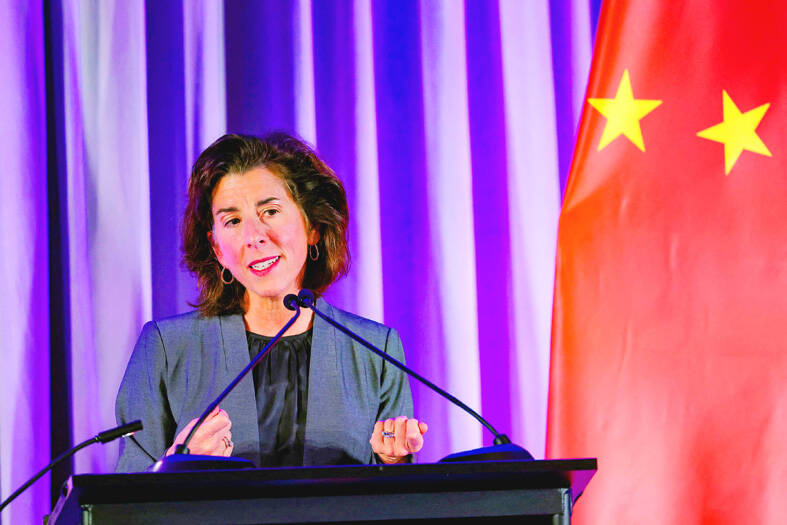US Secretary of Commerce Gina Raimondo on Saturday urged lawmakers, Silicon Valley and US allies to stop China from getting semiconductors and cutting-edge technologies key to national security.
Speaking at an annual national defense forum in Simi Valley, California, Raimondo called Beijing “the biggest threat we’ve ever had” and stressed that “China is not our friend.”
The world’s top two economies are locked in a fierce commercial and geopolitical rivalry, in which her department plays a leading role.

Photo:Reuters
In October, Raimondo unveiled a series of restrictions on the export of advanced chips to China, including those used in the development of artificial intelligence (AI), to prevent their use by Beijing for its military.
“I know there are CEOs of chip companies in this audience who were a little cranky with me when I did that, because you’re losing revenue. Such is life, protecting our national security matters more than short-term revenue,” she said.
“Newsflash: Democracy is good for your businesses. Rule of law here and around the world is good for your businesses,” she said.
Raimondo said that Nvidia Corp, maker of the most sophisticated chips needed to develop the latest generation of AI, had developed a product that performs just below the limit set by her department for export to China.
“That’s what industry does,” she said. “That’s not productive.”
“Every day China wakes up trying to figure out how to do an end run around our export controls ... which means every minute of every day, we have to wake up tightening those controls and being more serious about enforcement with our allies,” she said.
Separately, the US government proposed new rules on Friday regarding its electric vehicle (EV) subsidies, setting limits on material that producers can source from China or other rival countries.
The guidelines spell out how EVs could qualify for a tax credit of up to US$7,500 under US President Joe Biden’s landmark climate action plan, the Inflation Reduction Act.
They come as Washington works to reduce its burgeoning electric car industry’s reliance on China. Currently, the key EV industry is dominated by China.
Under the latest proposal released by the US Department of Treasury, an eligible clean vehicle cannot contain battery components made or assembled by a “foreign entity of concern” starting next year.
From 2025, a qualifying vehicle also cannot contain critical minerals extracted, processed or recycled by such entities.
This targets companies owned by, or subject to the jurisdiction of countries like China, Russia, North Korea and Iran. They would be barred from providing such materials to vehicles aiming to qualify for tax breaks.
A firm could be considered a foreign entity of concern if it were incorporated in one of these countries, or if it hit a 25 percent ownership threshold.
The latest rules would likely reduce the number of vehicles eligible for tax credits while piling pressure on automakers as they grapple with the transition to producing electric cars.

Nvidia Corp chief executive officer Jensen Huang (黃仁勳) on Monday introduced the company’s latest supercomputer platform, featuring six new chips made by Taiwan Semiconductor Manufacturing Co (TSMC, 台積電), saying that it is now “in full production.” “If Vera Rubin is going to be in time for this year, it must be in production by now, and so, today I can tell you that Vera Rubin is in full production,” Huang said during his keynote speech at CES in Las Vegas. The rollout of six concurrent chips for Vera Rubin — the company’s next-generation artificial intelligence (AI) computing platform — marks a strategic

Enhanced tax credits that have helped reduce the cost of health insurance for the vast majority of US Affordable Care Act enrollees expired on Jan.1, cementing higher health costs for millions of Americans at the start of the new year. Democrats forced a 43-day US government shutdown over the issue. Moderate Republicans called for a solution to save their political aspirations this year. US President Donald Trump floated a way out, only to back off after conservative backlash. In the end, no one’s efforts were enough to save the subsidies before their expiration date. A US House of Representatives vote

Shares in Taiwan closed at a new high yesterday, the first trading day of the new year, as contract chipmaker Taiwan Semiconductor Manufacturing Co (TSMC, 台積電) continued to break records amid an artificial intelligence (AI) boom, dealers said. The TAIEX closed up 386.21 points, or 1.33 percent, at 29,349.81, with turnover totaling NT$648.844 billion (US$20.65 billion). “Judging from a stronger Taiwan dollar against the US dollar, I think foreign institutional investors returned from the holidays and brought funds into the local market,” Concord Securities Co (康和證券) analyst Kerry Huang (黃志祺) said. “Foreign investors just rebuilt their positions with TSMC as their top target,

REVENUE PERFORMANCE: Cloud and network products, and electronic components saw strong increases, while smart consumer electronics and computing products fell Hon Hai Precision Industry Co (鴻海精密) yesterday posted 26.51 percent quarterly growth in revenue for last quarter to NT$2.6 trillion (US$82.44 billion), the strongest on record for the period and above expectations, but the company forecast a slight revenue dip this quarter due to seasonal factors. On an annual basis, revenue last quarter grew 22.07 percent, the company said. Analysts on average estimated about NT$2.4 trillion increase. Hon Hai, which assembles servers for Nvidia Corp and iPhones for Apple Inc, is expanding its capacity in the US, adding artificial intelligence (AI) server production in Wisconsin and Texas, where it operates established campuses. This